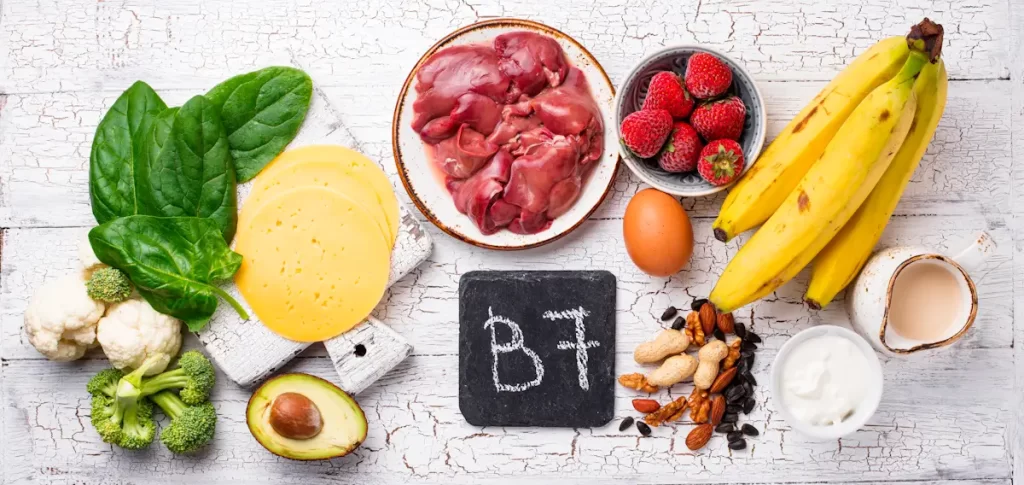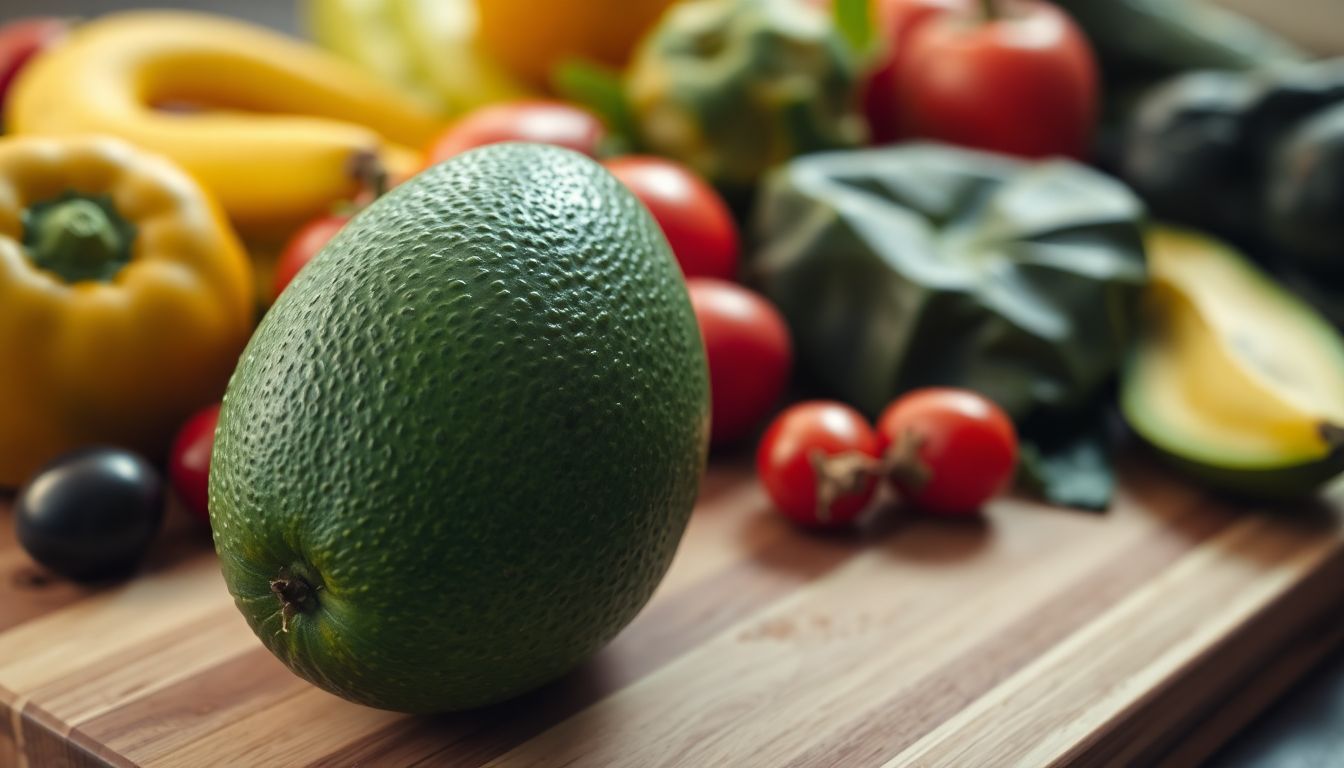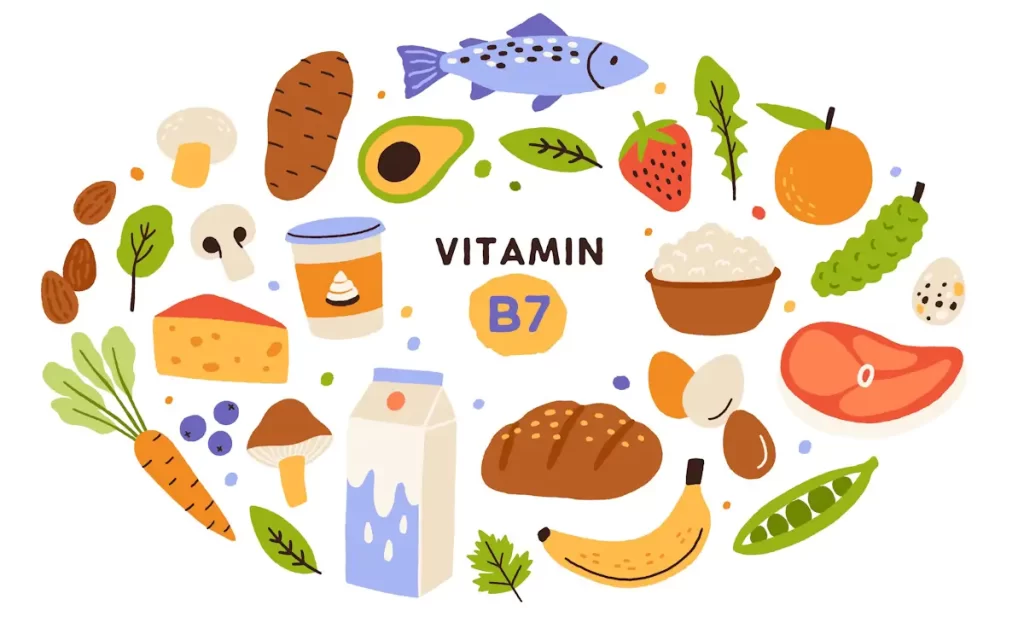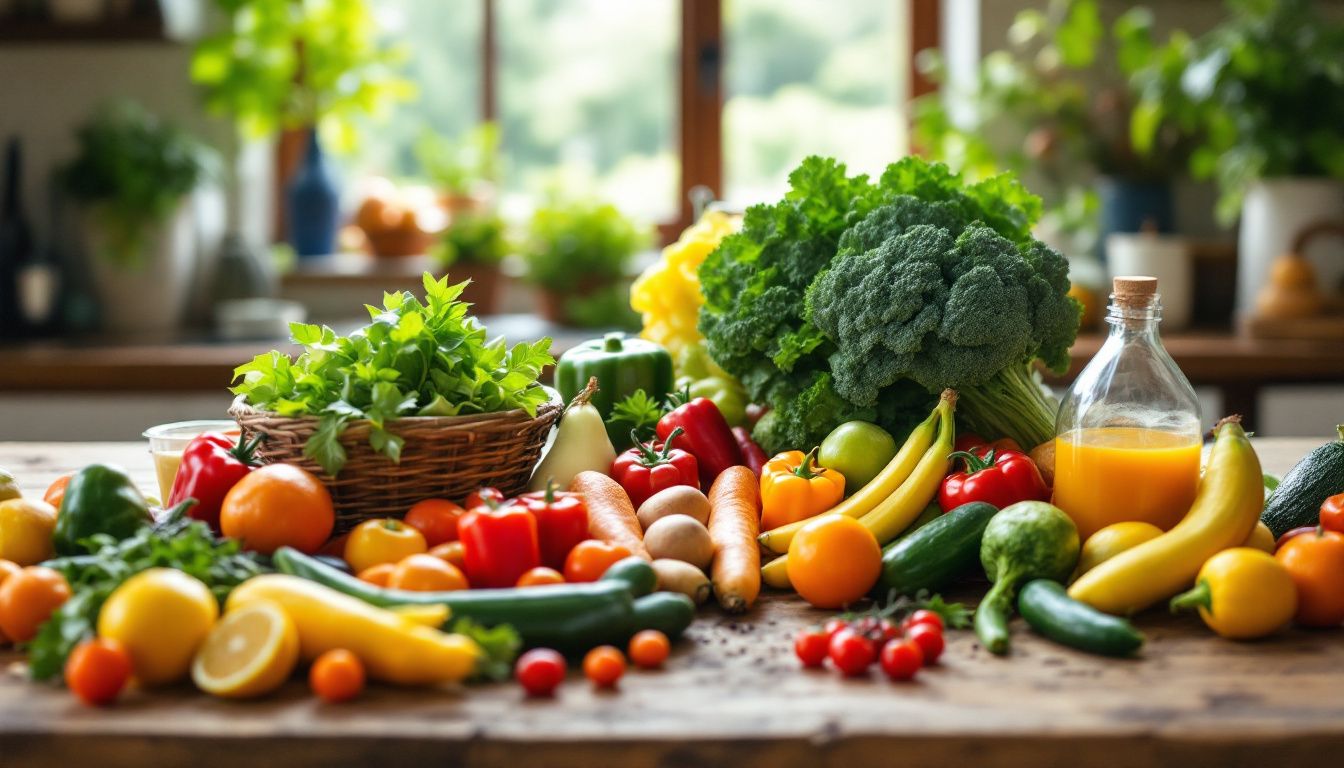Hair thinning, brittle nails, or dull skin can be frustrating. Vitamin B7, also called biotin, may help with these issues and more. This blog will explain its health and beauty benefits, food sources, and proper usage.
Thank you for reading this post, don't forget to subscribe!Keep reading to learn how biotin might fit into your routine!
Key Takeaways
- Biotin, or Vitamin B7, supports metabolism by breaking down fats, carbs, and proteins into energy. It also aids in hair growth, skin health, and nail strength.
- Foods like egg yolks (10 mcg per egg), sweet potatoes (2.4 mcg per ½ cup), almonds (up to 9.5 mcg/serving), and beef liver (30.8 mcg/3 oz) are rich in biotin. Avoid raw egg whites as they block absorption.
- Adults need about 30 mcg of biotin daily; kids require between 12–25 mcg depending on their age. Pregnant women may need up to 35 mcg/day for health support during pregnancy or breastfeeding.
- Deficiency can cause brittle nails, thinning hair, rashes around the face/mouth area, and neurological symptoms like tingling or depression.
- High-dose supplements can interfere with lab tests such as thyroid function or heart attack markers; consult a doctor before use if taking medications or undergoing tests.
Key Health Benefits of Biotin
Biotin plays a major role in how your body turns food into energy. It also helps keep you looking and feeling great, inside and out.
Supports metabolism
Vitamin B7 boosts energy in your body. It helps enzymes break down fats, carbohydrates, and proteins from food. This process gives cells the fuel they need to work properly.
Biotin plays a key role in fatty acid and amino acid metabolism. It also supports gluconeogenesis—a process that makes glucose from non-carbohydrate sources. Some studies suggest it may lower blood sugar levels for those with type 2 diabetes.
Promotes healthy skin, hair, and nails
Biotin supports thicker hair, smoother skin, and stronger nails. It plays a role in protein metabolism, helping the body build keratin—a key part of hair and nails. People with biotin deficiency often face brittle nails, thinning hair, or scaly rashes around the mouth, nose, and eyes.
Some people take high-dose biotin supplements to improve hair health or fight brittle fingernails. While marketed for these benefits, studies show they mostly help those lacking in this water-soluble vitamin.
Foods like egg yolks, nuts, and sweet potatoes offer natural ways to boost levels without needing dietary supplements.
Aids in neurological functions
Vitamin B7 plays a big role in brain health. It helps nerves work properly and supports mental clarity. Without enough, symptoms like depression, numbness, or even seizures can appear.
People with biotin deficiency may also suffer from hallucinations or feel very tired.
High-dose biotin therapy might improve nerve function for those with multiple sclerosis (MS). This therapy shows promise but should be monitored by a doctor. Maintaining adequate intake of this water-soluble vitamin is key to avoiding neurological issues long-term.

Dietary Sources of Biotin
You can get biotin from many everyday foods. Adding these to meals may help support your health and beauty goals.
Eggs and dairy products
Cooked eggs are a great source of biotin. A single egg provides 10 micrograms, helping with daily nutritional needs. Eating raw eggs, though, is not the same—avidin in raw whites blocks biotin absorption.
Cooking destroys this effect and unlocks its benefits.
Dairy products also contribute small amounts of vitamin B7. For example, one cup of 2% milk contains about 0.3 micrograms. While not as rich as eggs, combining dairy with other biotin-rich foods can improve overall intake for hair health and skin care.
Nuts and seeds
Sunflower seeds and walnuts contain a significant amount of biotin. Roasted almonds can provide anywhere between 1.5 to 9.5 micrograms of this B vitamin in one serving. These snacks are delicious and promote hair health, skin health, and nail strength.
Including nuts like walnuts or almonds in your daily diet enhances fat metabolism and carbohydrate metabolism as well. Seeds such as sunflower ones effortlessly complement salads or yogurt bowls for added nutrients.
Consider whole grains next for more biotin-rich foods!
Whole grains and certain vegetables
Whole grains like oats, brown rice, and barley contain small amounts of biotin. These make them good choices for a balanced diet rich in vitamin B7. Sweet potatoes especially stand out—half a cup offers 2.4 micrograms of biotin, which covers about 8% of your daily value (DV).
They can boost your hair health and skin health while adding fiber too.
Mushrooms are another great source. A 100-gram serving of portabella mushrooms packs 11.1 micrograms of biotin. This supports metabolism by aiding in carbohydrate and protein breakdowns.
Including these foods helps maintain proper nutrient intakes without needing high-dose supplements!
Biotin Deficiency: Signs and Symptoms
Lack of biotin can lead to noticeable changes in your body—these signs might urge you to pay closer attention.
Hair thinning and loss
Hair thinning and loss can happen due to biotin deficiency. This condition, also called alopecia, often shows up when the body lacks enough Vitamin B7. Hair may become weak, brittle, or even fall out in patches.
Pregnant women are especially at risk, with about one-third in the U.S showing mild biotin deficiency despite proper food intake.
Eating raw egg whites over a long time might make things worse. They have avidin, which blocks biotin absorption in the gut. Adding biotin-rich foods like egg yolks, sunflower seeds, and beef liver can help restore hair health.
Biotin supplements might also support stronger hair growth for those with low levels of this essential nutrient.
Skin rashes
Scaly red rashes can appear around the eyes, nose, mouth, and genitals due to biotin deficiency. These skin problems are rare in the U.S. because most diets provide enough vitamin B7.
Seborrheic dermatitis is a common issue linked to low biotin levels. This condition causes flaky or greasy patches on the skin. Eating biotin-rich foods like egg yolks, sweet potatoes, and sunflower seeds may help improve skin health over time.

Neurological symptoms
A lack of vitamin B7 can harm the nervous system. Common signs include numbness, tingling in hands or feet, seizures, and muscle pain. Depression and hallucinations may also occur.
Biotinidase deficiency—a rare genetic disorder—worsens these issues by blocking the body’s ability to use biotin.
This deficiency affects brain function over time if untreated. Early detection is vital to prevent nerve damage or serious complications. Foods like egg yolks and beef liver help support neurological health by keeping biotin levels steady.
Proper intake protects against problems linked to low levels of this water-soluble vitamin.
Recommended Daily Intakes of Biotin
Biotin needs vary by age and life stage. Proper amounts help support your hair, skin, nails, and overall health.
Intake for adults and children
Adults need 30 micrograms of biotin daily. This amount supports metabolism, skin health, and hair growth. Lactating women require slightly more—35 micrograms per day to meet their nutritional needs.
Children’s intake depends on age. Kids aged 4-8 years should get about 12 micrograms a day, while teens up to 18 years need around 25 micrograms. These recommendations ensure healthy development for young ones.
Sources like egg yolks and beef liver can help meet these needs naturally.
Special considerations for pregnant and breastfeeding women
Pregnant women often need more biotin due to higher metabolism. The adequate intake (AI) for pregnancy is 30 micrograms daily. This amount supports energy production and healthy fetal development.
Breastfeeding women require even more, with an AI of 35 micrograms per day. Lactation increases nutrient demands, making it vital to meet these needs through food or dietary supplements.
Biotin-rich foods like eggs, nuts, and sweet potatoes can help maintain proper levels during this time.
Potential Risks and Side Effects
Taking too much biotin can sometimes upset the balance of your body. It may also affect specific lab test results, leading to incorrect diagnoses.
Excessive supplementation concerns
High-dose biotin supplements, ranging from 10–300 mg, can cause issues. The FDA warned in November 2017 about interference with lab tests. These supplements may lead to false results for hormones like thyroid or markers for heart attacks.
No Tolerable Upper Intake Level (UL) exists because no direct harmful effects have been found. Despite this, unnecessary high intakes can disrupt medical evaluations and create confusion in diagnoses.
Always stick to the recommended dietary allowances (RDA).
Interaction with lab tests and medications
Biotin supplements can affect lab test results. They may lead to falsely low troponin levels, which are used to diagnose heart attacks. High doses of biotin could also interfere with tests measuring hormones, such as thyroid function.
Certain medications like Mysoline, Carbatrol, and Dilantin may interact with vitamin B7. These drugs could lower biotin levels in the body over time. Always talk to a healthcare provider before taking supplements if you’re on medications or scheduled for tests.

Usage and Supplementation
Choosing the right biotin supplement can feel tricky with so many options. Focus on natural sources first, but supplements may help if your levels are too low.
How to choose the right biotin supplement
Look for biotin supplements with clear labeling and proper certifications. Pick products that list “biotin” or “vitamin B7” clearly on the packaging. Dosages between 2.5 to 10 milligrams are common in these supplements, especially those targeting hair health, brittle nails, and skin health.
Stick to trusted brands that meet safety standards. Check reviews and seals from groups like USP or NSF International. If you take other medications or have conditions like Crohn’s disease, ask your doctor first—it helps avoid risks or interactions.
Optimal ways to incorporate biotin naturally in your diet
Eat eggs and dairy products. Egg yolks are rich in biotin, but avoid raw egg whites—they can block absorption. Add 3 ounces of salmon to your weekly meals for 5 micrograms (17% DV).
Snack on nuts like almonds or sunflower seeds for a natural boost.
Include vegetables such as sweet potatoes or spinach for extra nutrients. Half a cup of bananas adds 0.2 micrograms into your daily intake. For the best source, try beef liver—3 ounces provide 30.8 micrograms (100% DV)! Opt for whole grains over refined ones for more B vitamins too.
Conclusion
Biotin plays a big role in your beauty and health. It helps with metabolism, supports hair and nails, and keeps your skin glowing. Foods like eggs, nuts, and sweet potatoes are rich in biotin.
Supplements can help if you have a true deficiency but speak to your doctor first. Stay mindful of balance to enjoy its full benefits!
